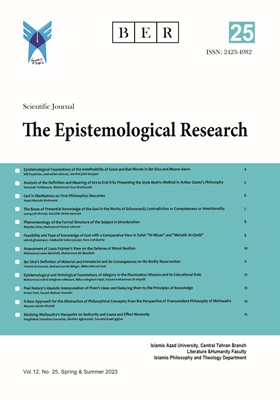Feasibility and Type of knowledge of God with a Comparative View in Tafsir "Al-Mizan" and "Mufatih Al-Ghaib"
Subject Areas : Epistemological researcheszeinab ghasempour 1 , habibollah halimi jloudar 2 , reza mahdiyanfar 3
1 - Fourth level student, Kausar Institute of Higher Education, Sisteran Seminary, Tehran; Iran
2 - Associate Professor of the Qur'an and Hadith Department, Faculty of Theology and Islamic Studies, University of Mazandaran. Babolsar. Iran
3 - Associate Professor of Quranic Sciences and Education University of Qom.iran
Keywords: Sensory knowledge, intuitive knowledge, Innate Knowledge, Possibility of Knowledge, Rational Knowledge,
Abstract :
Undoubtedly, one of the most important philosophical and theological topics is the discussion about God, but without understanding the method, it will be impossible to know God. Today, due to the differences between Islamic denominations, the best defense of the truth is to discover the points of commonality and difference and to explain the views of the parties in the verses of the Holy Quran. The current research, which is based on the method of description and analysis by studying and examining the two commentaries of "Al-Mizan" and "Mufatih Al-Ghaib", examines the views and opinions of two prominent commentators - Allameh Tabatabai and Fakhr Razi - from the two Shia and Sunni perspectives about the possibility of knowing God's essence. Therefore, in order to analyze the main issue, other points were also examined, for example, which of the two typological commentators that they have presented about God is one of the natural, rational, figurative, transferable, intuitive, and sensory cognitions? The result is that Allameh Tabatabai, contrary to Fakhrazi's view, acknowledges the impossibility of fully knowing God, the limitation of intellectual knowledge, and ignoring direct and intuitive knowledge is the most important difference between Fakhrazi's view and Allameh's; Allameh Tabatabai's point of view in analyzing the problem is more coherent and does not have any conflict.
* قرآن کریم. (1415ق). ترجمه محمد مهدى فولادوند، قم: دارالقرآن الکریم.
* نهجالبلاغه. (1379ش). ترجمه محمد دشتی، قم: مشهور.
ابنبابویه قمی، محمدبنعلى(صدوق). (1398ق). التوحید، قم: جامعه مدرسین.
ابنسینا، حسینبن عبدالله. (1376). الالهیات من کتاب الشفا، تحقیق: حسن حسنزادهآملی، قم: مرکز النشر الطبایع المکتب الاعلام الاسلامی.
تمیمىآمدى، عبدالواحدبنمحمد. (1410ق). غررالحکم و دررالکلم، قم: دار الکتاب الإسلامی.
حرعاملى، محمدبنحسن. (1409ق). وسائل الشیعة، قم: مؤسسة آل البیت ع.
الزرکان، محمدصالح. (بیتا). فخرالدین الرازی وآراءه الکلامیه والفلسفیه، بیروت: دارالفکر
طباطبایى، محمدحسین. (1390ق). المیزان فی تفسیرالقرآن، بیروت: مؤسسة الأعلمی.
همو. (1387ش). معنویت تشیع، قم: انتشارات تشیع.
همو. (1404ق). نهایة الحکمه، قم: مؤسسة النشر الاسلامی.
همو. (1387ش). اصول فلسفه و روش رئالیسم، قم: بوستان کتاب.
همو. (1382). بدایه الحکمه، قم: نشر قدس.
همو. (1427). الرسایل التوحیدیه، قم: موسسه نشر اسلامی، چ4.
فخررازى، محمدبنعمر. (1420ق). مفاتیح الغیب، بیروت: دارإحیاء التراث العربی.
همو. (1383ش). چهارده رساله، تهران: دانشگاه تهران.
همو. (1411ق). محصلافکارالمتقدمین والمتاخرین منالحکماء والمتکلمین، عمان: دار الرازی.
همو. (1407). مطالب العالیه، بیروت: دارالکتب العربی.
همو. (1406ق). لوامع البینات شرح اسماءالله تعالی و الصفات، قاهره: مکتبه الکلیات الازهریه.
همو. (1986م). الاربعین فی اصولالدین؛ قاهره: مکتبه الکلیات الازهریه.
همو .(1378ش). المحصل، قم: شریف رضی.
فیضکاشانى، محمدمحسن. (1406ق). الوافی، اصفهان: کتابخانه امام أمیرالمؤمنین على(ع).
فارابی، ابونصر. (1405ق). الجمع بین رای الحکیمین، مقدمه: البیر نصری نادر، تهران: الزهرا.
فیومی، احمدبن محمد. (1405ق). المصباح المنیر، قم: هجرت.
قمى، على بنابراهیم. (1404ق). تفسیرالقمی، قم: دارالکتاب.
قاسمی، حمیدمحمد. (1382ش). تمثیلات قرآنی؛ ویژگیها، اهدف و آثار تربیتی آن، قم: اسوه.
کرمانی، اوحدالدین. (1366). دیوان رباعیات اوحد الدین کرمانی، تهران: سروش، چ1.
کلینى، محمدبنیعقوب. (1407ق). الکافی، تهران: دارالکتب الإسلامیة.
مصباحیزدی، محمدتقی. (1378ش). آموزش فلسفه، قم: مؤسسهآموزشی پژوهشیامام خمینی.
مطهری، مرتضی. (1388ش). معارف قرآن، تهران: صدرا.
همو. (1380). مجموعه آثار، تهران: صدرا.
مجلسى، محمدباقر. (1403ق). بحار الأنوار، بیروت: دارإحیاء التراثالعربی.
_||_

